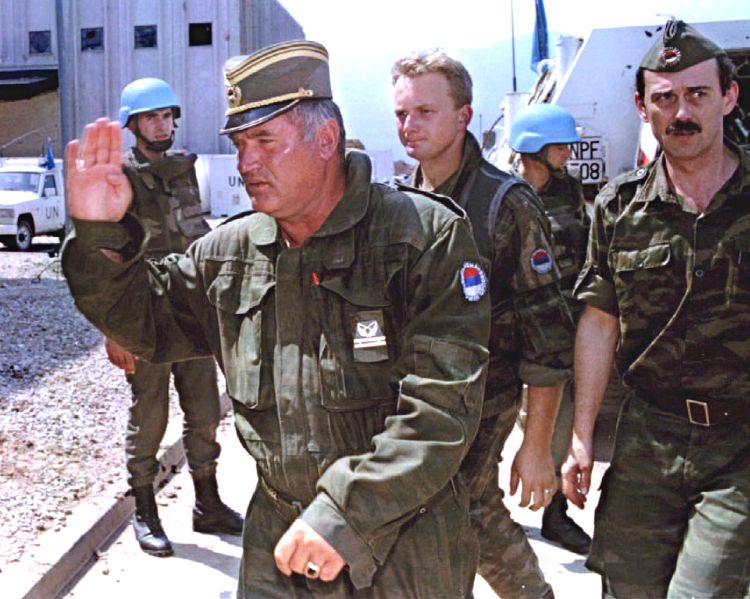BERLIN — Ratko Mladic, the former Serb warlord who commanded forces that carried out some of the worst atrocities of the Balkan wars, was found guilty of genocide and other crimes against humanity by an international tribunal Wednesday.

Ex-Bosnian Serb wartime general Ratko Mladic appears in court Wednesday at the International Criminal Tribunal for the former Yugoslavia in the Hague, Netherlands.
The 74-year-old Mladic was sentenced to life in prison. Mladic, whose attorneys had sought to block Wednesday’s judgment on the grounds that he was too ill to attend trial, had been removed from the courtroom before the verdict was read after he shouted insults at judge Alphons Orie.
Also at The Hague to witness the verdict were survivors, including those who had been held in concentration camps and lost family members during a years-long military campaign against Bosnian Muslims that judges have ruled amounted to a genocide.
The judge reading the verdict Wednesday said that the crimes committed by Mladic “rank among the most heinous known to humankind.”
The judgment came after a trial that lasted over four years, and involved testimony from nearly 600 witnesses.
Many of them detailed a litany of horrors carried out by forces under Mladic’s command during the war in Bosnia from 1992 to 1995. They included the July 1995 massacre of more than 7,000 Bosnian Muslim men and boys at Srebrenica, a supposed U.N. safe haven. Mladic was also convicted of orchestrating the indiscriminate shelling of Sarajevo, the Bosnian capital.

Bosnian Muslim women cry near the coffin of a relative, one of the victims from the 1995 Srebrenica massacre, in Potocari Memorial Center, near Srebrenica in 2014. Bosnian Serb forces commanded by Ratko Mladic killed up to 8,000 Muslim men and boys in the massacre.
Mladic’s conviction marks the last major prosecution by the International Criminal Tribunal for the former Yugoslavia (ICTY), which was set up by the U.N. Security Council more than two decades ago.
The prosecutions are considered the most important war crimes trials in Europe since the Nuremberg trials of Nazi perpetrators.

A woman reacts as court proceedings for Ratko Mladic at The Hague are broadcast on a television at the Potocari Memorial Center near Srebrenica, Bosnia and Herzegovina, Wednesday.
Of the 161 individuals indicted by the tribunal on war crimes charges, none remain at large today.
In many cases, the perpetrators were tracked down after exhaustive international manhunts that lasted over a decade. Mladic went into hiding in 1997, and was only apprehended in 2011, when Serb police found him living in a cousin’s village near the Romanian border.
Mladic’s conviction follows that of the Serb political leader who took his country to war in Bosnia. Radovan Karadžić was convicted by the tribunal last year of crimes against humanity, and sentenced to 40 years in prison.
The war broke out in 1992 as the former Yugoslavia collapsed, and Bosnia declared independence. Serb forces initially sought to defend Bosnian Serb territory, but soon spread violence across the country.
Wednesday’s judgment found that Mladic persecuted Croats and Muslims with the intent of creating “ethnically clean” territories.
The Washington Post’s Luisa Beck contributed to this report.
Send questions/comments to the editors.



Success. Please wait for the page to reload. If the page does not reload within 5 seconds, please refresh the page.
Enter your email and password to access comments.
Hi, to comment on stories you must . This profile is in addition to your subscription and website login.
Already have a commenting profile? .
Invalid username/password.
Please check your email to confirm and complete your registration.
Only subscribers are eligible to post comments. Please subscribe or login first for digital access. Here’s why.
Use the form below to reset your password. When you've submitted your account email, we will send an email with a reset code.